R.R. Washburn's Blog, page 3
August 6, 2014
The Good, the Bad, and Their Life Expectancy
Over the years, I’ve come to notice certain character traits that are prevalent in many of our modern stories, be they books, TV shows, movies, or video games. More often than not, they take place in nitty gritty worlds with dystopian elements, be it zombies or war or pandemics. Upon noticing these traits, it’s also come to my attention the flaws and contradictions that tend to accompany them.
Does this mean they’re bad stories? Not at all! In fact, I love things like The Walking Dead, The Last of Us, and A Song of Ice and Fire. But each of these manner of stories share a very common theme that’s been preached throughout, and that’s that the good guys die, and the bad guys survive.
Except that bad guys tend to die, too, and that seems to be something that a lot of stories these days neglect to really explore — or even acknowledge. Unfortunately, we’ve become so obsessed with antiheroes that we fail to really appreciate the goodness in individuals as well. That we’ll all destined to turn on each other if we are to last in a harsh world. Which is ironic because, in a lot of the stories that seem to advocate becoming a bad person, it also shows that being a bad person will just as likely get you killed. Yet they continue to insist that you can’t be a decent person, even though they’ve proven themselves that their own philosophy is wrong.
At this point it’s not even just me complaining about the good guys not always winning, it’s about the message that modern stories seem to be trying to tell us. And that’s not a kind of story that I want to tell, or even relish in.

In many of these stories that we see encourage monstrous behavior in a lawless world, we also see that bad people tend to get their comeuppance in the end. That their distorted views lead to their downfalls. It’s the same for storylines supporting the idea that you must only look out for Number One, even though it’s also proven that going it alone can also get you killed.
So why do we see so many of these stories today trying to tell us that lying, cheating, and stealing is key to survival? Are they unaware of it, or do they want us the audience to judge these actions for themselves?
Who knows.
What I do know is that, based on what I’ve seen and heard, it’s equally becoming popular in frustrating fans as it is for those who write them. Maybe we should take a page from that and reevaluate the stories we want to share.
Does this mean they’re bad stories? Not at all! In fact, I love things like The Walking Dead, The Last of Us, and A Song of Ice and Fire. But each of these manner of stories share a very common theme that’s been preached throughout, and that’s that the good guys die, and the bad guys survive.
Except that bad guys tend to die, too, and that seems to be something that a lot of stories these days neglect to really explore — or even acknowledge. Unfortunately, we’ve become so obsessed with antiheroes that we fail to really appreciate the goodness in individuals as well. That we’ll all destined to turn on each other if we are to last in a harsh world. Which is ironic because, in a lot of the stories that seem to advocate becoming a bad person, it also shows that being a bad person will just as likely get you killed. Yet they continue to insist that you can’t be a decent person, even though they’ve proven themselves that their own philosophy is wrong.
At this point it’s not even just me complaining about the good guys not always winning, it’s about the message that modern stories seem to be trying to tell us. And that’s not a kind of story that I want to tell, or even relish in.

In many of these stories that we see encourage monstrous behavior in a lawless world, we also see that bad people tend to get their comeuppance in the end. That their distorted views lead to their downfalls. It’s the same for storylines supporting the idea that you must only look out for Number One, even though it’s also proven that going it alone can also get you killed.
So why do we see so many of these stories today trying to tell us that lying, cheating, and stealing is key to survival? Are they unaware of it, or do they want us the audience to judge these actions for themselves?
Who knows.
What I do know is that, based on what I’ve seen and heard, it’s equally becoming popular in frustrating fans as it is for those who write them. Maybe we should take a page from that and reevaluate the stories we want to share.
Published on August 06, 2014 16:01
May 19, 2014
One for the LGBTeam
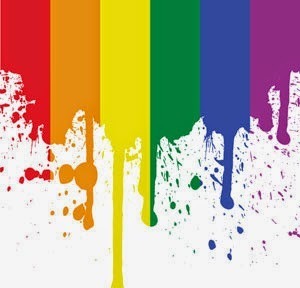 Let me tell you something.
Let me tell you something.I think the whole “scoring points for LGBT” thing I see people say so often these days is stupid. Yes, this is a thing that exists. I’ve seen people use this term quite often, in fact.
By LGBT points I mean: When characters in media are portrayed as gay, lesbian, bi, or trans, it’s obviously just a half-assed attempt of the creator(s) to garner an audience or ratings - or all of the above. That it’s often seen as “unnecessary” for a character to be gay and there’s no way that they’re doing it for any reason than to get attention because that’s totally how the creative process works.
And I hate it when people act like a scorecard is necessary for any of these less-than-often portrayed characters in media, because all the same it discourages creators from portraying these types of characters. Writers shouldn’t feel remiss about including a gay or lesbian character in their story because they’re worried people might accuse them of trying to connect with the LGBT crowd.
All I have to say is: Why does this have to be seen as such a negative thing? When straight characters are portrayed in media, no one accuses the writers of trying to score any points with the “heterosexual crowd”, so why should it be any different for gays, lesbians, bisexuals, and transgender? Or any of the minority for that matter. No one should feel pressured to avoid risks or following their creative path simply because people will judge them for “not understanding” what it feels to be that minority, or whatever.
Here’s a secret, and it might come off as a total shock to people, but hear me out.
Crazy,right?
They say write what you know, and that’s why research was invented. That’s why the internet is such a vast and boundless source of information. There are interviews, documentaries, biographies that are readily available for you to utilize if you are confused. That’s why you read stories and talk to people and learn and grow as a person and as a creator. That’s the beautiful thing about writing fiction! So long as you show that you have a reasonable understanding of the topic you’re writing about, you don’t have to be gay or bi or trans or any minority group so long as you understand. We’re not some bizarre alien species from a distant planet that can’t be empathized with. We feel and love and think like every other human.
Allow me to put it this way. Personally, I have no idea what it’s like to be straight. Yes, there was a time where I thought it was possible for me to have romantic feelings for a boy, but my true feelings towards them had been completely superficial - a simple want to have what everyone else has. I’m aware of this now, but back then I was confused and maybe even a little bit of a closet homophobe, not so much afraid of gays but of the possibility that I might be myself. I have never been physically intimate with a member of the opposite sex, and yet that doesn’t stop me from writing heterosexual characters in my stories.
Characters will write themselves. Sometimes they’ll surprise you in ways you can’t imagine. Back in high school and college, my first two drafts of PROJECT SERAPHIMrevolved around my protagonist who started initially as developing feelings for a man. She was a much different character back then. I had intended to write her as asexual in the current incarnation, but my plans had been thwarted during the creative process in the second novel, where I realized that my character was, incidentally, starting to develop romantic and sexual feelings towards another woman. This was hardly a game changer for me, even though it was the first time I had ever written a novel that centers a closeted lesbian. It’s actually something that I can relate to. Something that I know. But in reality, it’s not that much different than when I was writing her having romantic/sexual feelings towards a man.
Moral of the story: Don’t be afraid of scrutiny. Take risks. It’s your story, these are your characters. Let them make their own decisions, love who they want to love, and be who they want to be. That’s not to say you must write minority characters, but this is just me saying that you shouldn’t be afraid of doing so for fear of being judged for it by any sides. And if anyone accuses you for trying to score some points for the LGBTeam?
...
No one’s really been keeping track of the score, anyway.
Published on May 19, 2014 12:03
April 25, 2014
ENOUGH With The Comedic Relief!
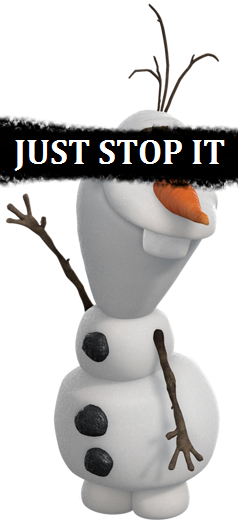 Please... no more...The other day I finally ripped off the Frozen band-aid, so to speak. I know you’re probably not here to read my opinions on Disney movies, but rest assured this isn’t some kind of review. It’s just that certain things grated my nerves. Something that extends far beyond whatever beef I had with this particular movie. It wasn’t even a matter of trying to pinpoint what it was, because it became blatantly obvious the moment it reared its ugly bucktoothed head into the story.
Please... no more...The other day I finally ripped off the Frozen band-aid, so to speak. I know you’re probably not here to read my opinions on Disney movies, but rest assured this isn’t some kind of review. It’s just that certain things grated my nerves. Something that extends far beyond whatever beef I had with this particular movie. It wasn’t even a matter of trying to pinpoint what it was, because it became blatantly obvious the moment it reared its ugly bucktoothed head into the story.Since Frozen was out all I kept hearing from friends was how Olaf, this goofy-looking snowman character, was not as “annoying as I thought he’d be”. Once I finally decided to give the film a chance, I wondered “What if I actually wind up liking Olaf?”
Spoilers: It didn’t happen. Here’s why.
Nothing pisses me off more than comedic relief characters. Characters that serve no other purpose other than to bounce around the screen making humorless jokes. Characters that could simply be written out of the script and nothing would change. Throughout the movie I was thinking to myself just how much these scenes would’ve been impacted had Olaf not been written into the script, and here’s the thing – I got nothing. Literally nothing would’ve changed, save for the removal of an obnoxious musical number and maybe a scene towards the end that could’ve been easily altered without his presence.Frozen is hardly the first culprit to this crime, and definitely not going to be the last. It’s a reoccurring theme in a lot of animated movies, and even live action ones. I don’t know a single soul who would lament the absence of Jar Jar from the Star Wars prequels or Ruby Rhod from The Fifth Element – characters whose screentime practically render my viewing experience into a miserable depth of self-loathing when I realize there had been a thought and storyboarding process that went into the creation of them. That people paid an actor to wail into a soundbooth or flap about in front of a camera to say stupid lines and do stupid things for the amount of money I could probably buy a house with. It makes me want to sit the writers down and introduce them to this really novel concept.
Comedic relief characters don’t need to exist.
That’s it. You really don’t need them. Even my experience with Frozen had earned some chuckles, and none of them from Olaf – but mostly Kristoff, this dude who sells ice. I liked him! Despite hating the movie more than I did, my roommates even have a Kristoff doll in our living room, and after seeing the whole bloody affair I can finally see why! I also enjoyed the tête-à-tête between the two main characters. It was really the only thing I can say I thoroughly had fun with.
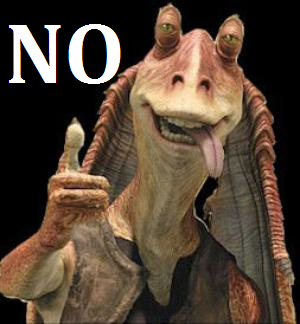 "Comedic Relief" - probably the best thing to happen since herpes!So here’s the skinny, and I’ll say it again: Comedic relief characters don’t need to exist, because you can write funny jokes with your main characters. Shocking, I know. Who would’ve thought you could have a witty protagonist and still have drama happen to them? They can still take things seriously when things need to be serious, and crack a joke to keep the tone light.
"Comedic Relief" - probably the best thing to happen since herpes!So here’s the skinny, and I’ll say it again: Comedic relief characters don’t need to exist, because you can write funny jokes with your main characters. Shocking, I know. Who would’ve thought you could have a witty protagonist and still have drama happen to them? They can still take things seriously when things need to be serious, and crack a joke to keep the tone light.Having rewatched How To Train Your Dragon recently, I realized how flawlessly DreamWorks pulled off a balance of wit and drama. Hiccup is a perfect example that you can have a hero who can be funny and still save the day – because he’s written like a normal person (which is ironic considering the time period, but you don’t exactly refer to a kid’s movie for historical accuracy). Even the characters you could arguably consider “comedic relief” do serve a purpose in the climax of the movie, and aren’t just ugly props of bad jokes. What more, it’s still entertaining for both children as well as adults. I could seriously go on about how ideal How To Train Your Dragon compared to Frozen is, but I digress.
Whether you’re writing a story, a comic, or even a movie script, I think all writers should reevaluate the importance of a character, especially if they’re just there to dish out “humor” and nothing else. Basically, if they’re not important to the story but to serve as a distraction to your audience and script, you probably need to consider how your main characters are written. Because you can just as easily put a balance of the two into one character without having to toss in an insufferable stereotype whose only function is to burn screentime that could go into serving more well-rounded, more interesting characters.
So no, I don’t want to build a snowman.
Especially one as goading and pointless as Olaf.
Published on April 25, 2014 13:58
April 3, 2014
Help Support SERAPHIM ASCENT on GoFundMe.com!
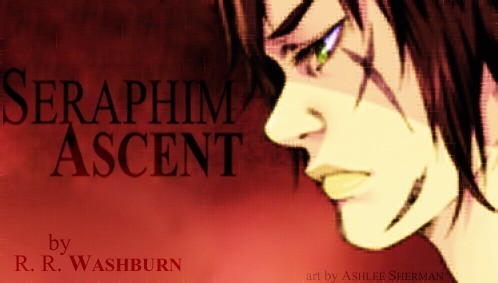
“This will only hurt a little bit.”
After waking up in the morgue of an abandoned sanitarium, Rey has only a toe tag to her name and no recollection of how she got there.
Shattered by a global war called the Long Winter, the city she awakens to is just as splintered - the American government having collapsed into two authorities called the Western Order and the Eastside Republic. With borders shut down and guarded and only pockets of civilization remain, laws are altered so that the meek are reprogrammed by a regimen called permutation.
For a woman with a fractured past, Rey learns that neutrality is not a luxury she can afford when she’s caught in the middle of cyberterrorist warfare between the Western Order and an organization calling themselves the Vorpals. Rey finds herself labeled an enemy of the state and a terrorist herself, and she must embrace her role if she has any hope to unearth her stolen identity from the Chancellor of the Western Order.
They say that time heals, and the truth will set you free. But Rey will learn that she is connected to people on both sides of this blood-spattered coin, which will raise the question if the truth is a skeleton worth digging out of the closet.
SERAPHIM ASCENT is the first book of an Adult science fiction/mystery/horror series, featuring an ensemble of those afflicted by their dystopian society in this mid Twenty-Second Century Earth.So I’m starting up this fundraising campaign to get my novel finally published. Actually, I’m trying to get three novels published this year, but that’ll depend on time and funding.
If you’re unable to donate, please at least signal boost! Any help to get me off my feet would be very much appreciated. :)
Published on April 03, 2014 14:49
March 30, 2014
What's Up With Villain's Names?
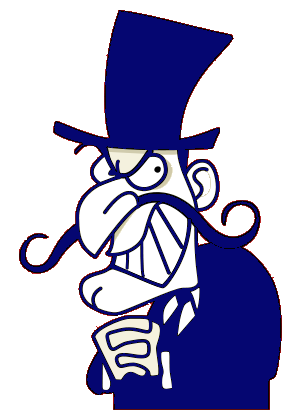 Writers. Friends. We sometimes like having villains in our stories, yes? Or antagonists who are driving forces that propel our plot, stand in the way of our protagonists, and more often than not we wish them to be evil and villainous to justify the actions of our main characters. Yes?
Writers. Friends. We sometimes like having villains in our stories, yes? Or antagonists who are driving forces that propel our plot, stand in the way of our protagonists, and more often than not we wish them to be evil and villainous to justify the actions of our main characters. Yes?Which begs to question... what’s up with villain names?
No, really. What kind of mother gives birth to her child and says, “Yes, my darling baby will henceforth be named Darko Beelzebub and golly he will grow up to achieve great things!”
Although I find this to be a more common theme with high fantasy novels, something which is a little out of my element. But every now and then I will pick one up and go, “Well, what did they expect?” Like who names their son Galbatorix (Eragon)or Darken-freaking-Rahl (Wizard’s First Rule) and not expect that they’re going to turn out to be nasty people? I’ll at least try to give Lord Voldemort some credit, as maybe he found that the name Tom Riddle wouldn’t exactly strike fear into the hearts of the wizarding community. But still. Can I just say that Tom Riddle is actually a pretty cool name?
It genuinely makes me curious as to what creative process goes through writer’s heads when coming up with names for their antagonists (assuming they have one at all). For me and the horror genre in general, most of the time an antagonist’s name can be anybody’s, and that’s what I love about it. It’s perfectly realistic to imagine a parent naming their child Joe or Sally and not expect them to grow up to become a bloodthirsty psychopath. It’s not like they’re damning them to a life of socipathy. And when they are given really evil names, it’s usually given to them by either themselves or people who decided to call them Belphegor the Butcher.
For me, as far as the Seraphimbooks are concerned, I like to think that names such as “Gregory” and “Rhea” and “Jonah” are more liable to initially inspire trust and confidence than fear — and that’s how I think a good opposite force should be. Someone who you can think and trust to do good, but have more selfish ulterior motives in mind. Not some moustache-twirling man wearing spikes and a dark cloak, sitting behind his desk, petting his lapdog while trying to assure you that his name is Dark Lord Astaroth of the Shadow Realm, and he is absolutely not a villain.
...
Huh. Kind of makes me actually want to write a Darko Beelzebub as a protagonist now.
Published on March 30, 2014 15:59
March 27, 2014
Hush Redux
 A few years ago, I wrote a short story. Several years later, I tweaked and rambled about it a little. The other night, I started expanding on it a little bit more. I have posted an excerpt of the short story over here.
A few years ago, I wrote a short story. Several years later, I tweaked and rambled about it a little. The other night, I started expanding on it a little bit more. I have posted an excerpt of the short story over here.Like the other characters from this particular project of mine, Hannah Vallejo's story is one I've been wanting to tell for a long time, as she was created during my late night/early morning drives through dark country roads. To this day she holds a very near and dear place in my heart.
(Also Hannah just happens to be my favorite girl name. When I was a kid and hated my name like most kids usually do, I wanted to change my it to "Hannah" when I was old enough to. Of course my adult sentiments have changed since then. This absolutely has no bearing on the story or the character, other than the fact that I was able to fulfill my childhood wish via my literary child owning my favorite name.)
Anyway, I have other plans for Hush to be part of a potential short story anthology involving two other characters from the same storyline, if my current plans for it fall through. Either way, I have some big things in store for poor Hannah Vallejo.
Published on March 27, 2014 15:02
March 8, 2014
David the Dinosaur
Wow, sure has been a few months since I updated.
I wish I had some long-winded subject to talk about, but I really have to kick myself in the butt to get started on the sequel to the first book I'm trying to publish.
To motivate myself, I did a quick little Photoshop of one of the characters from said novel, David the Dinosaur.
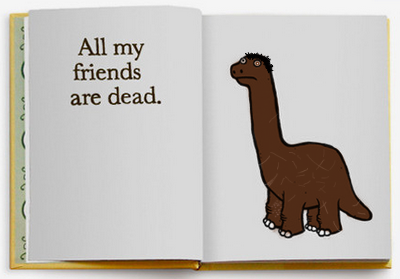
You know. For fun. :)
Spoilers: He's not really a dinosaur.
I wish I had some long-winded subject to talk about, but I really have to kick myself in the butt to get started on the sequel to the first book I'm trying to publish.
To motivate myself, I did a quick little Photoshop of one of the characters from said novel, David the Dinosaur.

You know. For fun. :)
Spoilers: He's not really a dinosaur.
Published on March 08, 2014 13:41



